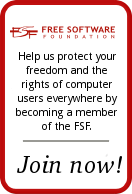The New Scientist post has the headline: “Amazon harnesses cloud with Kindle Fire tablet” http://www.newscientist.com/blogs/onepercent/2011/09/amazon-announces-kindle-fire-t.html
I don’t think that “harnessed” is the right word. It ought to be “shackled.”
The DRM consistently applied to the ebooks delivered from Amazon will be added to the DRM of the games, the videos, the whatever. Digital Rights Management is a lock put on the content you buy from Amazon. It is available from Amazon — as long as Amazon continues to offer it.
If Amazon no longer offers the game or movie or ebook, it will disappear from the vaunted cloud and no longer be available. You’ll have no backup copy if your Fire “goes out.” You won’t, in fact own anything. You will effectively be a renter, a borrower, a contract worker without any benefits. Here today, gone tomorrow.
The promise of the “Personal Computer” was that it disconnected us from the mainframe. We not only installed software on our very own general purpose computer, we could hire programmers to make our business run exactly the way we wanted, using the software that our local experts developed. We could write that software ourselves, too. The PC granted us power. We broke free of the shackles. Some of us even broke free from the shackles of proprietary file formats and proprietary software. We eagerly joined a philosophical “software freedom” movement and attained even more creative control over our lives. It has been an exciting time.
Current thought is that we are seeing the decline of the PC as a “desktop” unit. “Death of the PC” [Forbes] [Seeking Alpha] I’ve had a personal computer since 1978. I’m not ready to give up my freedom.
I’m worried that we need, more than ever before, to jump aboard the software freedom bandwagon. We need to support the expansion of open hardware, open software, open networking. We need to take charge of the Internet and the “cloud” so we are not at the whim of corporations who will be the gatekeepers to our common wealth of information. Copyrights have been extended, not lessened in our fast-paced world where yesterday’s data is buried under twice as much produced today.
If every shred of access to that information is shackled to the cloud, if I cannot have my own personal, un-reclaimable copy, I am made culturally poor. The cloud, offered as a boon to us, may instead, become only an ephemeral glimpse through the fog. Data behind a paywall isn’t what I’m after. Culture shackled to the corporate cloud is anathema to me. It should be unacceptable to us all.
Clear your mind. Decide whether you want Amazon to own your books for you.
Think whether you will rush to buy into their walled garden just as millions have bought into the iEverything craze of the Apple Corporation. I owned an Apple IIe which let me program it, add electronics, make it MINE.
By the way, I am not singling out Amazon or Apple. They just represent the most current appropriators of access. Many others have convinced us that they should hold tightly to our culture. After all, don’t the big corporations know best?
I don’t think so!
[Did you know, you don’t own second generation seeds from your own field after you originally buy seeds from Monsanto?]
